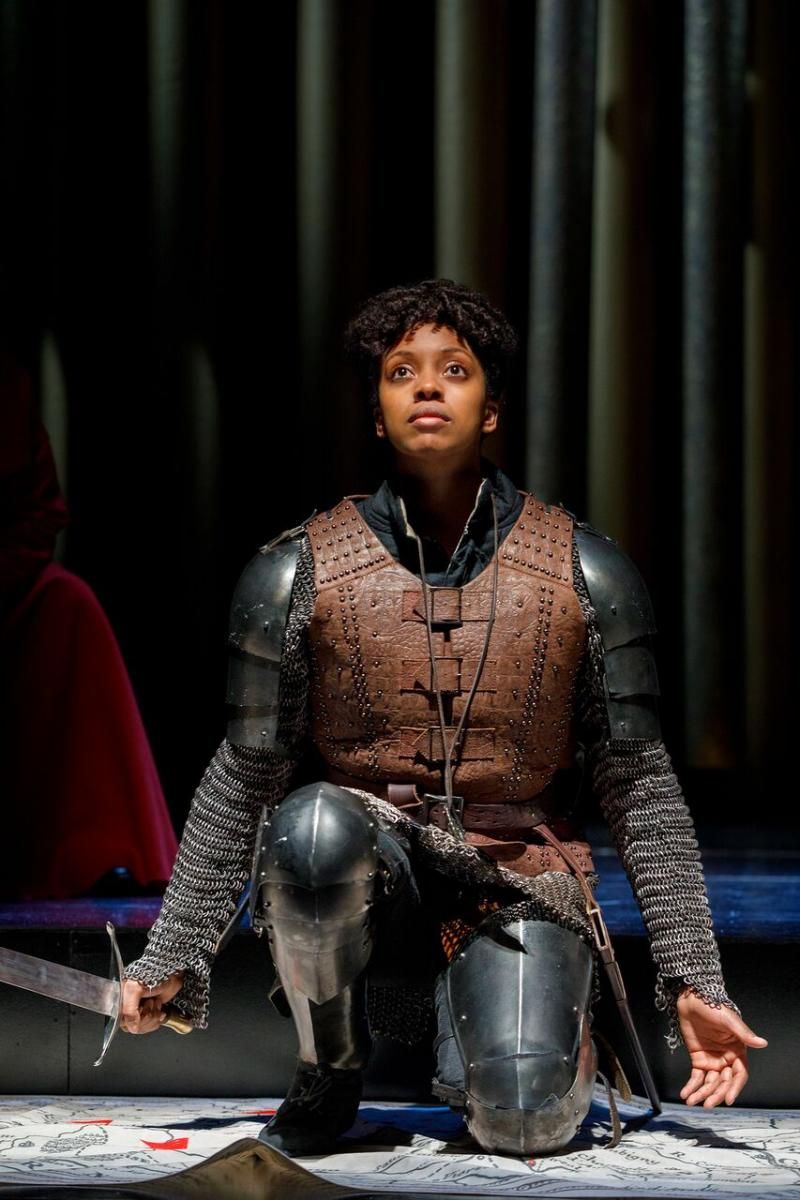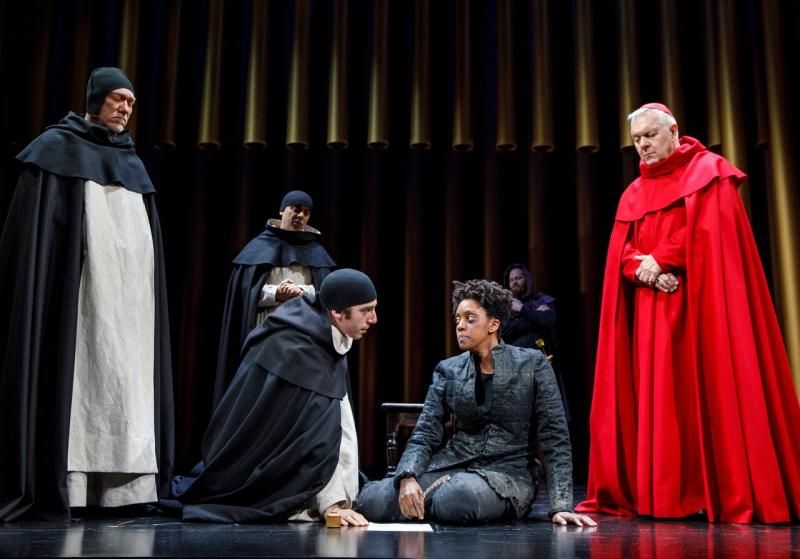Review: Shaw's SAINT JOAN Gains Fresh Relevance As Condola Rashad Plays a Teen Inspiring a National Movement
The title character of George Bernard Shaw's Saint Joan was burned at the stake nearly 500 years before the play premiered at Broadway's Garrick Theatre in December of 1923, but for many viewers there may have been a sense of topicality to the proceedings.

(Photo: Joan Marcus)
The teenager who claimed to hear holy voices instructing her in the ways to lead France's army to victories over the British occupiers was canonized by Pope Benedict XV just three years earlier, so discussion about her place in history and what it says about the blending of government and religion was no doubt fresh in the public's consciousness.
But perhaps more significant was that the world's strongest military powers were still trying to make sense of a recent World War so lacking in "bad guys" that on Christmas Day of 1914 (and sporadically as the war continued), soldiers along the front lines called an unofficial truce to spend the holiday exchanging presents, singing carols and playing games with those they would otherwise be attempting to kill.
Shaw concludes, and states in his preface to the play, that Joan was brought to trial, found guilty and executed by "normally innocent people in the energy of their righteousness" and that "the tragedy of such murders is that they are not committed by murderers."
Thus, one major emphasis in director Daniel Sullivan's very fine production of Saint Joan (where the playwright is billed with his more casual identity, Bernard Shaw) is that the seventeen men who make up all but one of the play's supporting ensemble appear as French and British characters who all believe their actions are for the greater good of mankind.
There's also a fresher relevance to this production in that the title character, played with wonderful conviction and realistic earnestness by Condola Rashad, is a teenager who gains public acceptance as the leader of a national political movement and suddenly makes extraordinary progress when the experienced adults previously in charge were making none.
As you might expect from Shaw, this is not a play depicting glorious scenes of victory in battle, nor even a spark of Joan's fiery death, but rather it's a series of philosophical discussions, ending with a futuristic epilogue that, in its off-beat comical way, has the characters evaluating their actions.

Max Gordon Moore, Condola Rashad and
Walter Bobbie (Photo: Joan Marcus)
Patrick Page, a commanding actor whose New York stage career consists primarily of playing evil types - or at least people we can conclude were supporting the wrong side of history - opens the play as Captain Robert de Baudricourt, who, at the moment, is more concerned with the lack of fresh eggs available to him than with his people's woes.
His steward (comically empathetic Robert Stanton) claims that the hens have stopped laying ever since the captain expressed refusal to talk with the young maid who has been speaking inspiring words to his soldiers.
While de Baudricourt may not believe that Joan actually hears the voices of St. Catherine, St. Margaret and St. Michael instructing her to go to the Dauphin Charles (a bratty Adam Chanler-Berat) and have him place her in charge of France's army, he recognizes that the soldiers believe her, and that her words can make them believe they have a greater purpose to fight more aggressively.
But her success is seen as a threat to the leaders on both sides, as it challenges the status quo of mediocre (or lesser) men making decisions. The Bishop of Beauvais (Walter Bobbie) fears that the public's perception that Joan receives instructions directly from God's messengers will lesson the power of the church. The Earl of Warwick (Jack Davenport) is concerned that her victories will be seen as God's will, making the monarchy subservient to the church. (Scott Pask's simple but very effective set frames the play with dozens of hanging organ pipes, representing religion's constant presence in everyday life.)
Everyone in charge, including the Inquisitor (Page again) feels they'd be better off if Joan were dead, but nobody wants to be seen as taking responsibility for it.
Rashad's invigorating performance insures that Joan's passions are motivated by selflessness and love, insuring that her innocence in understanding the institutionalized corruption of the ruling class is seen as a youth's uncomplicated common sense instead of naiveté.
"Why do all these courtiers and knights and churchmen hate me?" a confused Joan asks her companion in battle, Dunois (gracefully sympathetic and noble Daniel Sunjata). "I have brought them luck and victory: I have set them right when they were doing all sorts of stupid things: I have crowned Charles and made him a real king; and all the honors he's handing out have gone to them. Then why do they not love me?"
"Do you expect stupid people to love you for showing them up?" he answers.
Reader Reviews
Powered by
|
Videos

